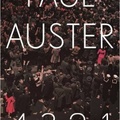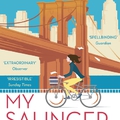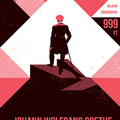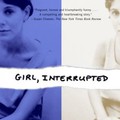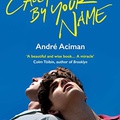Emily Arsenault: The Broken Teaglass
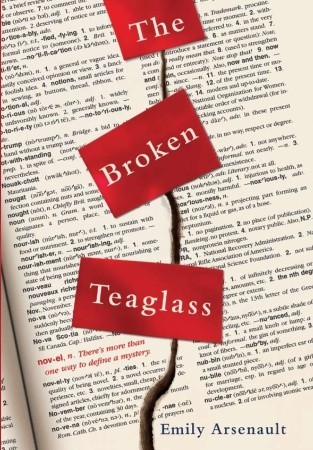
The protagonist of Emily Arsenault’s „scholarly detective novel”, Billy is employed by the biggest dictionary publisher of the US after graduating from university as a philosophy major. Life in the office is far from being exciting: the dictionary editors spend their days reading newspapers (not as a pastime activity, but in order to look for words newly emerging in the language), they poke around in the collection of quotations which help them define the meaning of words, or they try to agree on questions such as how the average American speaker pronounces words like „bruschetta” or „feng shui”.
But then things take an interesting turn when Billy and his pretty colleague, Mona come across a strange, slightly uncanny quotation in the collection which seems to be a quote from a non-existing book and which seems to be a small part of a story set in the premises of the publishing house. Billy and Mona start off on a quest together and soon they find more quotes from the non-existing book – and a tragic story slowly begins to unfold, a story which involves some of the earlier and current employees of the publishing house.
Based on my previous experiences with scholarly adventure novels, I don’t think it’s an easy task to write such a book. First there’s the prejudice that scholars are all impractical, out of this world people hiding in the depth of paper mines and living a life not particularly aboundant in exciting details. Presumably, not many people would like to read about less-than-interesting people like these as their pastime entertainment, therefore a writer undertaking the job of writing a novel about scholars must show that in fact their lives are no less exciting than the life of anyone else. And then the writer must make the mystery mysterious enough since this is vitally important in any detective novel.
Emily Arsenault managed to tackle both these difficulties quite well: her protagonists are likeable young people, very different from the image of the reclusive or annoyingly eccentric scholar. And the style and tone of the novel suits the protagonists perfectly: the narrator, Billy writes about the progress of their quest and the daily life in the office in a casual and witty style and he never makes the mistake of taking himself too seriously – his words are very pleasant to read. And the mystery itself and the environment in which the story is set are both captivating enough to engage the reader’s interest right until the end.
There’s one thing I miss from this novel though: the large amount of scholarly arguments which is usually present in the novels of this genre. True, the story features some short ruminations about language and linguistic questions, for instance, we get some nice ideas about the questions of pronunciation and about what counts as correct pronunciation (basically, the novel says, if the majority of people pronounces a word – such as „bruschetta” – „incorrectly”, then after a while that pronunciation won’t be considered incorrect in the given language anymore) – but I would have liked to read much more about topics such as this. I know there are scholarly books where I could read more about such questions, but I think it’s (or it should be) one of the most important features of a scholarly adventure novel that the characters discuss „serious” scholarly topics in an entertaining fashion and this way they entice the reader to go on and and get involved with those topics. This enticing line is virtually absent from Emily Arsenault’s novel – but apart from this, The Broken Teaglass is a good novel: it’s eminently readable, witty and hugely entertaining.
But then things take an interesting turn when Billy and his pretty colleague, Mona come across a strange, slightly uncanny quotation in the collection which seems to be a quote from a non-existing book and which seems to be a small part of a story set in the premises of the publishing house. Billy and Mona start off on a quest together and soon they find more quotes from the non-existing book – and a tragic story slowly begins to unfold, a story which involves some of the earlier and current employees of the publishing house.
Based on my previous experiences with scholarly adventure novels, I don’t think it’s an easy task to write such a book. First there’s the prejudice that scholars are all impractical, out of this world people hiding in the depth of paper mines and living a life not particularly aboundant in exciting details. Presumably, not many people would like to read about less-than-interesting people like these as their pastime entertainment, therefore a writer undertaking the job of writing a novel about scholars must show that in fact their lives are no less exciting than the life of anyone else. And then the writer must make the mystery mysterious enough since this is vitally important in any detective novel.
Emily Arsenault managed to tackle both these difficulties quite well: her protagonists are likeable young people, very different from the image of the reclusive or annoyingly eccentric scholar. And the style and tone of the novel suits the protagonists perfectly: the narrator, Billy writes about the progress of their quest and the daily life in the office in a casual and witty style and he never makes the mistake of taking himself too seriously – his words are very pleasant to read. And the mystery itself and the environment in which the story is set are both captivating enough to engage the reader’s interest right until the end.
There’s one thing I miss from this novel though: the large amount of scholarly arguments which is usually present in the novels of this genre. True, the story features some short ruminations about language and linguistic questions, for instance, we get some nice ideas about the questions of pronunciation and about what counts as correct pronunciation (basically, the novel says, if the majority of people pronounces a word – such as „bruschetta” – „incorrectly”, then after a while that pronunciation won’t be considered incorrect in the given language anymore) – but I would have liked to read much more about topics such as this. I know there are scholarly books where I could read more about such questions, but I think it’s (or it should be) one of the most important features of a scholarly adventure novel that the characters discuss „serious” scholarly topics in an entertaining fashion and this way they entice the reader to go on and and get involved with those topics. This enticing line is virtually absent from Emily Arsenault’s novel – but apart from this, The Broken Teaglass is a good novel: it’s eminently readable, witty and hugely entertaining.

